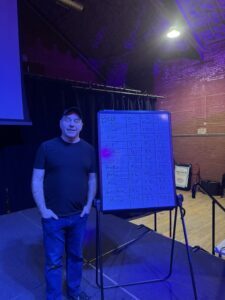Matthew Dicks's Blog, page 11
August 6, 2025
How to seek feedback

August 5, 2025
Join my Substack
Join my Substack and get a peek behind the creative curtain:
Learn about how disparate ideas combine to become blog posts, LinkedIn posts, magazine articles, stories for the stage, keynote topics, and actual books.
Watch as I record actual writing sessions where you can watch me write and edit books, columns, blog posts, and more, and discuss the decisions being made in real time.
Learn about the strategies I use every day to remain productive, inspired, and creative in my career as a bestselling novelist, an author of nonfiction, an award winning storyteller, keynote speak, and comic, and my day job as an elenentary school teacher — all while leading a full life as a husband, parent, friend, average golfer, above average poker player, and lover of books, music, and podcasts.
Ask me questions that might become future Substack topics or get answered in my Substack chat.
All this and more. Join here: https://matthewdicks.substack.com/

Our song, unexpected and unforgettable
We stepped into Place Jacques-Cartier in Old Montreal — a large, beautiful square near the Saint Lawrence River lined by twinkling lights, bustling restaurants, and tiny shops. It was our first night in Montreal — just three days ago — and we’d only been in the city for a few hours.
We were just starting to get our bearings.
In the center of the square, just a few feet from us, a musician began strumming his guitar.
We paused. We love live music.
A second later, he began singing. We knew the song instantly:
“When You Say Nothing At All” by Alison Krauss.
Our wedding song.
It’s not a song we hear very often, and it’s certainly not a song we’ve ever heard live, but at this moment, in this square, in Old Montreal, just as we happen to be passing by, more than 300 miles from home, a musician chose to play our song.
We are halfway through a wonderful trip to Canada. We’ve seen many fantastic things, spoken to some incredible people, and eaten some great food. We’ve done a walking tour of Old Montreal. Visited bookstores. Sat in the pews in Notre Dame Cathedral to watch a spectacular light show. Visited parks, monuments, fountains, and museums. Eaten delicious breakfasts and dinners and lots of ice cream.
Enjoyed nearly every moment of our trip so far.
But nothing will top that moment for me.
The combination of serendipity, nostalgia, and romance was overwhelming to me. It was beauty and perfection.
It was almost as if the universe had orchestrated this unlikely moment just for us.
I’ll never forget it.

August 4, 2025
Stick to the script
I travel a lot.
In the last three months, I have traveled to Miami, Toronto, Pittsburgh, Cleveland, Washington, DC, Toronto again, and Victoria.
Next week I’ll be in Traverse City, Michigan,
These are only the places where I have flown. I’ve also driven to Montreal, Quebec City, Boston, NYC, and Providence.
To make this travel happen, I have systems in place to ensure everything runs smoothly. This includes a backpack that, except for clothing, is always ready to go. Anything in my backpack that I sometimes need outside my backpack is duplicated, so it can never be forgotten, and my backpack’s contents are a masterpiece of preparation and efficiency.
Perhaps one day I’ll create a list of its contents to share with you.
I also have TSA PreCheck, Clear, and Global Entry to bypass long security lines. I can access all of my airline apps biometrically. I have accounts with a preferred car rental agency, two preferred hotel chains, and an airport parking service.
Establish a routine, and maintain that routine, and you’ll rarely go wrong.
So when I was flying with my friend, Ellen, from Victoria to Connecticut last week, it made no sense for me to break from my established routines, but I did. I have a security pocket in my backpack for my passport, and when I don’t need it, that is where it stays.
Except while waiting in the Vancouver airport with Ellen, I broke with routine and placed my passport in my back pocket, knowing I would need it to board the flight from Vancouver to Denver. Rather than taking the nine seconds to secure my passport in my backpack, I decided to make things easy and simply keep it in my pocket.
About 30 minutes later, as the plane began boarding, I returned from the restroom, reached for my passport, and discovered it was gone.
Somewhere along the way, I had lost it, which meant I would not be permitted on the flight from Vancouver to Denver.
I tried not to panic, but it was difficult not to. I couldn’t believe it. The one thing you can’t afford to lose in a foreign country is your passport, and I had done just that.
I launched from my seat and retraced my steps, going first to the shop where I purchased a soda, searching the floor between the refrigerated case and the cashier. Then I returned to the restroom, which I had just used. When I entered, I saw a small boy using the urinal that I had been using minutes before, so I stood behind him, a little too closely, waiting for him to move.
A man beside me gave me a curious look. I hadn’t realized until that moment that I had cut ahead of the man.
“I dropped my passport somewhere,” I said. “And my plane is boarding. I just used this urinal, so I’m waiting for him to finish so I can look.”
The man pointed at the floor in front of me. “It’s right there.”
“What?” I said. I was so panicked I could not see straight. I looked where the man was pointing and saw nothing.
“It’s right there,” he repeated, pointing again.
And yes, when I looked closer, I saw it, inches from my left foot.
I scooped it up, thanked the man, and bolted to my gate, only to find Ellen in a similar state of panic. “I’ve never felt so helpless in my life,” she said. “I couldn’t leave my bags, but I couldn’t just leave you hanging. It was awful.”
Indeed, it was.
I learned the value of routines and procedures from a combination of years in the Boy Scouts followed by a decade spent managing McDonald’s restaurants While watching “The Founder” — the biopic about McDonald’s founder Ray Kroc, Elysha watched a scene where systems in the kitchen were being established with enormous effort and precision and asked me, “Is this why you are you?”
Yes. At least partially so. I’ve always been a believer in finding the best way to do something and sticking to it.
Except last week, when I skipped a routine and was nearly stranded in the Vancouver International Airport.
Routines and procedures are created to prevent mistakes and avoid stupidity.
This fleeting moment of panic was a good lesson for me:
Stick to the script, jerk. You wrote it for a reason.

August 3, 2025
Patriarchy at the car dealership
While I was working in Pittsburgh last month, Elysha went shopping for a new car.
Her car was 14 years old and not running well. It was time.
After test-driving several makes and models, she and Charlie went to Lia Hyundai and found a car that she loved:
A 2025 Hyundai Tucson Hybrid
She negotiated a fair price with the salesperson and was passed off to a finance manager.
Before they began discussing options, she made it clear to the finance manager and the salesperson that she would not be purchasing a car today. She told them that I would be back in Connecticut the next day, and we would make the final decision together.
The finance manager suggested she place a deposit on the car.
Elysha declined.
The finance manager pressured her to place a deposit on the car.
“No,” she said. “That’s not how we make decisions in our family. We do things like this together.”
Then the finance manager said:
“Does your husband know that you’re shopping for a car today?”
This question is atrocious for many reasons. Even Charlie — age 13 — was appalled by the question when he heard it.
But here’s something to think about:
Is there any question in your mind about the sex of this finance manager?
I haven’t mentioned their sex yet. I deliberately avoided pronouns. I made it so their sex was unknowable. But you probably assumed the finance manager was a man, and if so, you are correct,
Of course it was a man.
For the record, I knew she was shopping for a car because we had spoken on the phone earlier that day.
But did Elysha need to inform me that she was shopping for a new car?
Of course not.
When it came to the actual purchase, we would obviously discuss the decision, but she certainly didn’t need to tell me where she was shopping for a car, what she was considering, or what she was thinking.
More importantly:
If I had been the one shopping for the car and refusing to put down a deposit, would the finance manager have asked me:
“Does our wife know you’re shopping for a car?”
Almost certainly not.
The finance manager probably had no idea that his stupid, gendered, sexist, patriarchal statement had just cost his dealership a sale.
Elysha finished negotiating a fair price, exited the dealership, and immediately called another Hyundai dealership nearby. She informed the salesperson — a woman — about the situation and told her that if she could match the offer, she would purchase the car at her dealership.
Done deal.
We visited the dealership to make the purchase a few days later. Elysha’s salesperson wasn’t working that day, but she came in to introduce herself and pass us off to a fellow salesperson to complete the purchase.
The finance manager at this particular Hyundai dealership — who also happened to be a woman — was outstanding. She made the process simple, offered us extended warranties, and quietly waited for us to make a decision.
No pressure. No patriarchy.
Elysha’s new car is sitting in the driveway right now.
Asking a woman if her husband knows she’s shopping for a car is a question you might rightly expect if it were 1956 or 1967 or 1978 or 1989. It wouldn’t make it right, but you could see it happening.
But if you’re still asking that question in 2025, you have a problem.
Also fewer sales.

August 2, 2025
Resolution update: July 2025
Every month, I record my progress toward my yearly goals to hold myself accountable and occasionally seek help and advice from readers who are willing to offer insight, ideas, and solutions.
Here are my results from July.
PERSONAL FITNESS/ATHLETICS1. Don’t die.
I’m rucking now. Thirty pounds on my back.
I’m going to live forever.
2. Lose 10 pounds.
Two more pounds gained in July. Good job, Matt.
Back to even in 2025.
3. Do a targeted push-up workout at least four times per week.
Done.
4. Complete 100 sit-ups four times per week.
Done.
5. Complete three one-minute planks four times a week.
Done.
6. Cycle for at least five days every week.
I completed just 17 rides in July — a mix of indoor and outdoor.
I was in Toronto, Pittsburgh, Washington, DC, Victoria, and NYC in July — a total of 13 days out of town, making it hard to get on a bike.
A total of 168 rides so far this year.
7. Try at least three new vegetables I have never eaten before or do not like.
I ate my first gooseberry in July, which is not a fruit.
8. Get a DEXA Scan and VO2 Max test at least once in 2025.
Done!
9. Lower my handicap to 19.9.
I played ten rounds of golf in July, and my handicap rose to 27.2
WRITING CAREER10. Complete my eighth novel.
Work continues.
11. Write, edit, and revise my golf memoir.
No progress.
12. Write my “Advice for Kids” book.
Solid progress. Nearly complete.
13. Write/complete at least three new picture books, including one with a female, non-white protagonist.
No progress.
14. Write about my childhood in partnership with my sister, Kelli, at least once per month.
No progress.
15. Write a new solo show.
Done!
16. Submit at least three Op-Ed pieces to The New York Times for consideration.
No progress.
17. Write at least four letters to my father.
I sent my father a birthday card in March.
One letter so far this year.
18. Write 150 letters.
A total of 12 letters were written in July to students, former students, fans, clients, and my kids.
A total of 139 letters have been written in 2025 so far.
19. Write to at least six authors about a book I love.
No progress.
STORYTELLING/SPEAKING CAREER20. Launch a new Homework for Life app.
Done! You can download Apple’s App Store now!
21. Record and publish at least 25 videos on my YouTube channel.
Four videos were posted in July. A total of 23 videos have been posted in 2025 so far.
Thanks to my production manager, my YouTube channel is really taking off.
22. Perform a new solo show.
Done! Two sold-out shows were performed in May. New venues are now being sought.
23. Revise my free Storyworthy Academy.
Done.
Thanks primarily to the work of my partner and production manager, we have an outstanding free academy for anyone who wants to learn more about storytelling.
Check it out at storyworthy.com.
24. Record and produce at least three new Storyworthy courses.
Done! Two new courses have been completed and are now ready to launch with our new website.
25. Produce a total of six Speak Up storytelling events in 2025.
No shows were produced in July.
We have produced five shows in 2025 so far:
January 11 at the Connecticut Museum for History and CultureFebruary 7 at District in New HavenMay 10 at the Connecticut Museum of History and CultureJune 7 at the Mark Twain HouseJune 28 at Hartford Flavor Company26. Submit pitches to at least three upcoming TEDx events, hoping to be accepted by one.
No progress.
27. Attend at least eight Moth events with the intention of telling a story.
I attended one Moth StorySLAM in July. Sadly, my name remained stubbornly in the bag.
A total of seven Moth events in 2025.
28. Win at least one Moth StorySLAM.
Done! I won my 62nd Moth StorySLAM in March.

29. Win a Moth GrandSLAM.
No Moth GrandSLAM opportunities yet.
30. Pitch “You’re a Monster, Matthew Dicks” or my new show to six theaters in 2025.
No progress.
31. Produce at least 24 episodes of our podcast Speak Up Storytelling.
No progress.
32. Perform stand-up at least six times.
No progress in July.
I’ve performed stand-up once in 2025.
33. Pitch three stories to This American Life.
No progress.
34. Submit at least three pitches to Marc Maron’s WTF podcast.
Two pitches to Maron in July.
35. Send a newsletter to readers at least 50 times.
Done!
Four newsletters were sent in July to my Storyworrhy audience, plus 14 to my Substack audience.
Check out my Substack here
https://substack.com/@matthewdicks
I’ve sent 68 newsletters so far in 2025.
HOME36. Organize the basement.
More progress! Bins cleared. More furniture eliminated.
36. Clear the garage of unwanted items.
Done! The garage is officially clean, and all unwanted items have been removed.
37. Replace our backyard shed.
A new shed has been purchased. Permitting is complete. Arrival time is 2-3 weeks.
38. Refinish the hardwood floors.
Done.
FAMILY/FRIENDS39. Travel to Europe.
We’ve decided to travel to Montreal and Quebec City instead of Europe this year.
40. Text or call my brother or sister once per month.
Done.
41. Bring my brother, sister, and me together at least twice in 2025.
No progress.
42. Take at least one photo of my children every day.
Happily, Clara’s camp provided photos every day.

43. Take at least one photo with Elysha and me each week.
Done.

44. Plan a reunion of the Heavy Metal Playhouse.
No progress.
45. I will not comment positively or negatively on the physical appearance of anyone except my wife and children to reduce the focus on physical appearance in our culture overall.
Done.
46. Surprise Elysha at least 12 times.
No surprises in July.
I’ve surprised Elysha seven times in 2025:
A surprise birthday party on January 4Post Valentine’s Day flowersClever and amusing office suppliesFlowers on the first day of testingDesserts for Elysha and her teammatesUkulele care packageMocktail subscription47. Play poker at least six times.
Done!
I played poker twice with Charlie in 2025 — both times using a video poker game on a plane.
I’ve also played dozens of sessions of online poker again on a legal, sweepstakes-based website. I’m in the black.
48. Spend at least six days with my best friend of more than 30 years.
I took two walks with Bengi in July.
A total of two days spent with Bengi in 2025.
MUSIC49. Memorize the lyrics to at least five favorite songs.
No progress.
50. Practice the flute at least four times per week.
No progress.
MISCELLANEOUS PROJECTS51. Host at least three dinner parties where I cook.
No progress.
52. Develop a course on self-confidence.
Progress continues. Strategies are being collected, an instructional outline is being developed, and I’m conducting interviews to gather thoughts and ideas.
53. Develop a list of strategies to help people deal with loneliness and produce it in some form.
I’ve started writing a book on the subject, based on the list of strategies I’m developing.
This was a surprise to me and my literary agent. Instead of writing the full book, I’ll write a proposal for it.
54. Read at least 12 books.
Done!
I read five books in July:
“Keep Going” by Austin Kleon
“Show Your Work” by Austin Kleon
“Big Dumb Eyes” by Nate Bartgatze
“Never Flinch” by Stephen King
“Lyrics to Live By” by Mitch Taylor
I’ve read 16 books thus far in 2025:
“Unreasonable Hospitality” by Will Guidara
“Schtick to Business” by Pete McGraw
”The Humor Code” by Pete McGraw
“Catching the Big Fish” by David Lynch
“Simply Said” by Jay Sullivan
”Miracle and Wonder” by Bruce Headlam and Malcolm Gladwell
“Revenge of the Tipping Point” by Malcolm Gladwell
”Factfulness” by Hans Rosling
”Fight” by Jonathan Allen and Amie Parnes
“Steal Like an Artist” by Austin Kleon
“The User’s Guide to Storytelling” by Doug O’Brien
“Keep Going” by Austin Kleon
“Show Your Work” by Austin Kleon
“Big Dumb Eyes” by Nate Bartgatze
“Never Flinch” by Stephen King
“Lyrics to Live By” by Mitch Taylor
55. Finish reading TIME’s 100 Best Children’s Books of All Time.
No progress in July.
I’ve read five additional books in 2025, bringing my total to 44 total books read off the list.
56. Edit our wedding footage into a movie of the day.
No progress.
57. Digitize a pile of DVDs that contain dance recitals, plays, and other assorted moments from the past.
Done!
58. Memorize three new poems.
Done!
I’ve memorized the following poems in 2025 thus far:
“This is Just to Say” by William Carlos Williams
“Fire and Ice” by Robert Frost
“Trees” by Joyce Kilmer
59. Post my progress regarding these resolutions on this blog and social media on the first day of every month.
Done.
August 1, 2025
Grace under pressure. Excellence amid uncertainty.
I spent the last four days in Victoria, Canada, at an incredible conference called IP3 hosted by business titan and thought leader Andrew Wilkinson, who has gathered some of the most interesting friends, acquaintances, fans, and business partners imaginable..
Possibly the best conference I’ve ever attended.
Attendees included entrepreneurs, world-famous comedians, musicians, writers, actors, health experts, activists, and more.
Brilliant, successful, inquisitive human beings who wanted to learn, share, and be inspired.
I also played a role at the conference — telling stories, teaching a workshop, and speaking to the group about ideas related to storytelling, communication, and empathy.
I also met and spent loads of time with people individually and in small groups, sharing my expertise while also learning a lot.
It was an honor to play a small role in this incredible event.
I also had the glorious fortune of attending this conference with my friend and fellow storyteller Ellen Last. Ellen has loads of experience and success in business alongside excellent storytelling skills, which made her an ideal person to join me on this adventure.
But perhaps the best thing about Ellen is a lesson for many:
I knew I’d be asked to tell stories, teach workshops, and share ideas at the conference, but I also knew that I could be asked to do any of these things at any time for any length of time. Things at this conference are scheduled but also fluid, which is a brilliant way to run a conference because it offers the flexibility to meet the needs of the attendees but requires the people involved to be able to react quickly, confidently, and effectively.
I love this.
I love standing on the edge of uncertainty, ready to leap onto the highwire at any moment, not entirely sure what I might be asked to do.
But very few people feel this way, especially if the uncertainty involves public speaking in front of some of the most successful people on the planet. I am an anomaly of sorts, or so I thought.
By joining me at this conference, Ellen also signed up for this uncertainty. She needed to be ready to perform on a moment’s notice, and she might not know when and if she would be performing until moments before, which actually happened on the final day.
She’d also find herself speaking to some of the most successful people on the planet, needing to impart wisdom and seamlessly fitting herself into the group despite knowing no one but me.
Despite all of this uncertainty and the idea that she might be performing in front of world-class entrepreneurs, comedians, and entertainers, Ellen was remarkably calm and supremely confident. She was positive, happy, and incredibly sociable despite the possible need to react quickly at any moment.
It was impressive.
Also unusual and wonderful.
Ellen, I suspect, understands something that so many do not:
It’s going to be okay.
Uncertainty is a part of life. Regardless of the circumstances, her skills, talent, and expertise would invariably kick in when needed, and she would perform well.
Maybe even brilliantly, which was the case when she was asked to speak with little notice.
When you know how to do something, you must trust that you’ll be able to do that thing whenever you are called upon to step forward. It might feel better and safer to know the future and prepare for the moment, but if you need to know when the moment is coming, you’ll never be ready to meet the moment when it arrives without warning.
You’re either someone who can only do the job when life is scheduled, orderly, and predictable, or you’re going to be someone who can step into the breach at any given moment, regardless of circumstances, and get the job done.
Performance under pressure means performance without buckling to the pressure, and Ellen did this brilliantly.
She joined me for three days in Victoria with little preparation or forewarning, and she carried herself like someone who knew she could happily and confidently get the job done at a moment’s notice, and she did.
We had a grand time together.
Trust yourself.
Trust your skills.
Trust your experience.
Know that your best will always be enough.
Be comfortable with the ever-present, unavoidable possibility of failure.
Know that people are people, regardless of their success, celebrity, or the size of their bank accounts.
Be excited about opportunities to perform whatever you do, even when those opportunities are embedded in uncertainty.
Ellen embodied all these qualities this weekend.
I was so happy to have her standing beside me.

July 31, 2025
Advice on thank you notes
I am a frequent writer of thank-you notes.
Thank you letters, too — whole pages of appreciation.
I love writing thank-you notes. I love thanking people for a job well done, a kindness received, or simple appreciation for who they are.
I teach my students the value of the unexpected or surprise thank you note—not for a gift but an act of kindness often overlooked or unmentioned.
Despite my affinity for the thank-you note, I would like to propose an end to the following statement and all statements like it:
“I was surprised you didn’t send a thank-you note.”
Statements like this make you a monster. They signal that you are passive-aggressive, unkind, and cruel.
If you’ve given a gift and are awaiting a thank-you note, you must find better ways to fill your time. Your life is clearly bereft of entertainment, importance, and meaning.
If you’re awaiting a thank-you note, you’ve somehow confused the act of giving with trading — a gift in return for an obligation. A supposed act of generosity in exchange for the expectation of a folded piece of cardboard adorned with a few formulaic sentences.
If you give or send a lovely gift to a friend or family member and don’t receive a thank you note, it’s okay to feel disappointed because receiving a thank you note is a lovely and sometimes even wondrous thing if the note is written well and heartfelt.
But gifts are meant to be given without the expectation of reciprocation, so get over it. Immediately. And don’t ever say a word about ut to the person kind enough to give you the gift.
If you’ve sent a gift through the mail and want to ensure it was received, a phone call or email to check is fine, but if you attempt to shame or guilt the recipient for failing to acknowledge the gift or thank you for it, stop it.
You’re a monster.
It’s not about you. It’s about the gift and the recipient.
Checking to ensure the postal service hasn’t failed you is reasonable. Passive-aggressively scolding someone for not thanking you makes you look needy, petty, and ignorant about the spirit of giving.
If you’ve been verbally thanked for the gift but still feel disappointed about not receiving a written thank-you note, stop it. Expressions of appreciation need not be delivered in written form. Verbal thank yous are just as valid as written ones.
If you actually express your disappointment, befuddlement, or faux confusion over failing to receive a thank-you note, you should stop giving gifts because you don’t understand the purpose and nature of a gift:
To make someone feel loved, seen, known, and appreciated. Absent any expectation of reciprocity.
Expressing disappointment, befuddlement, or faux confusion over failing to receive a thank-you note transforms your gift into an onerous eyesore.
A constant reminder that you are a small and petty person.
Find better, happier, and more productive ways to spend your time than waiting for and expecting a thank-you note.
Don’t ruin the beauty of a gift by your sad and petty need for appreciation.

July 30, 2025
Unexpected media gifts are also perfect gifts
One of the best gifts you can ever give to someone — better than a cashmere sweater, a digital doodad, or a gift card — is the gift of entertainment:
A recommendation of a movie, television show, Broadway show, or musician that brings you hours of entertainment.
It costs the giver nothing, but it’s the kind of thing that can live in your heart and mind forever.
Kaia: “What We Do in the Shadows”Bengi: TeslaShep: “Peep and the Big Wide World” and “Battlestar Galactica”Coog: “Buffy the Vampire Slayer”Clara: “Gravity Falls”Georgia Juvelis: “John Proctor Is the Villain”Elysha: “Wait, Wait… Don’t Tell Me!” and Joe Strummer and Lyle LovettI’m almost certainly forgetting a bunch.

July 29, 2025
A rose by any other name…
I’m in Victoria, Canada, at IP3, a conference hosted by Andrew Wilkinson, founder of Tiny and a friend.
I was lucky enough to fly first class on this trip. When the flight attendant approached me and my seatmate, he said:
“Mr. Pecker, would you like something to drink?”
Mr. Pecker ordered a mimosa. One of five that he would drink over the five-hour flight.
People drink a lot of alcohol.
Then the flight attendant looked at his clipboard, found my name, and said, “Mr. Dicks…” and paused for a fraction of a second, doing everything he could to hold back a smile.
Pecker and Dicks, sitting side by side.
I ordered an apple juice.




